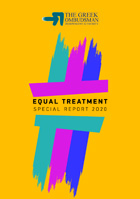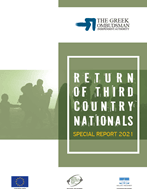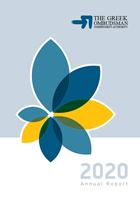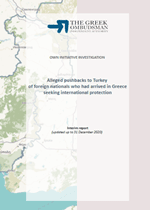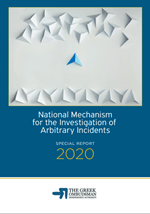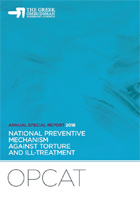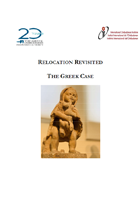News
ALL | 2022 | 2021 | 2020 | 2019 | 2018 | 2017 | 2016 | 2015 | 2014 | 2013 | 2012 | 2006 | 2004 | 2003
Results 116 to 120 out of 158.
2017
-
20/04/2017
- Rights of children on the move: Report and network at the initiative of the Ombudsman
In the context of the specific competence of the Ombudsman for the protection and promotion of the rights of the child, a report has been drafted, containing information, comments and proposals relating to the identification and registration of the population of children moving from third countries, their living conditions, access to basic goods and services and international protection procedures, as well as particular issues relating to unaccompanied children. It is the first six-monthly actions review of the Independent Authority’s mechanism for monitoring the situation of children on the move, supported by the UN International Children's Emergency Fund (UNICEF). Under this mechanism, at the initiative of the Ombudsman, a Network for the Rights of Children on the move has been established, involving three international intergovernmental organisations (UNHCR, UNICEF, International Organisation for Migration) and 15 non-governmental organisations providing services for refugee and migrant children at a panhellenic level. The commencement of the Network’s works at the beginning of 2017, aims to complement the Ombudsman’s initiatives in collaboration with the competent ministries, agencies, intergovernmental and non-governmental organisations, with the aim of protection and promotion of rights of children on the move. -
20/04/2017
- The Ombudsman in the network of National Prevention Mechanisms
The Deputy Ombudsman responsible for Human Rights George Nikolopoulos, participated in an event organised by the Council of Europe and the European Commission in Strasbourg, on 4-5 April 2017. The key issues of this inaugural meeting of the network of National Preventive Mechanisms against torture and other cruel, inhuman or degrading treatment or punishment (NPMs) were carrying out inspections of places of detention, reporting and recommendations, monitoring of their implementation and the relations with decision-makers and civil society. The event was attended by representatives of the UN Subcommittee on the Prevention of Torture (SPT), the Council of Europe Committee for the Prevention of Torture (CPT), the OSCE (OSCE/ODIHR), the National Prevention Mechanisms (NPM’Obs), as well as representatives from the Council of Europe, which are not members of the EU. Act 4228/2014 ratified in Greece the “Optional Protocol to the UN Convention against Torture and Other Cruel, Inhuman or Degrading Treatment or Punishment (OPCAT) and entrusted the Greek Ombudsman with the special responsibility of the National Prevention Mechanism. -
19/04/2017
- The Ombudsman seeks to regulate the status and operation of municipal kindergartens
The Ombudsman calls for immediate legislative initiative in establishing the system for the creation, operation and control of municipal kindergartens and the technical specifications of municipal day-care centres, nurseries, and kindergartens. It should be noted that so far the relevant Presidential Decree provided for by law has not been issued, thus creating serious issues in the control of operation, standards and suitability of kindergartens. -
12/04/2017
- Opinion of the Ombudsman on education of refugee children in Lesvos
In its report on the education of refugee children in Lesvos, drawn up after the Authority’s visit in schools, hostels and accommodation spots on the island, the Ombudsman underlines, inter alia, the need for support of preparatory actions for the inclusion of these children in education, awareness-raising amongst school communities and local societies, the operation of a kindergarten in Kara Tepe, but also the organisation of a sufficient number of integration classes in primary and secondary schools, for the new school year. -
12/04/2017
- ECtHR Chowdury and Others v. Greece (application no. 21884/15): a conviction which could have been avoided
The conviction of Greece by the European Court of Human Rights for violation of Article 4 § 2 (prohibition of forced labour) in the case of foreign land workers in Manolada, could have been avoided if the administration had taken timely measures as requested by the Ombudsman. The recent judgment of the Court makes extensive reference to the warning addressed by the Ombudsman in 2008 to the then leadership of competent ministries, stressing that despite the warnings, the State failed to protect victims, to adequately investigate the case and to punish the perpetrators.
Results 116 to 120 out of 158.




